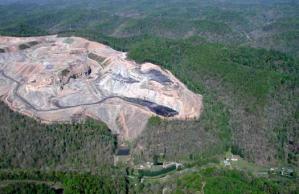 The Environmental Protection Agency announced Friday it will put the brakes on 79 pending permits for mountaintop removal coal mines in Appalachia because they likely pose environmental problems in violation of the Clean Water Act.
The Environmental Protection Agency announced Friday it will put the brakes on 79 pending permits for mountaintop removal coal mines in Appalachia because they likely pose environmental problems in violation of the Clean Water Act.
Also called surface mining, the technique often results in the burying of streams with blasted debris from mountaintops, and high levels of toxic metal runoff into adjacent valleys and community watersheds. EPA’s initial review concluded that all of the projects would likely cause water quality impacts and require additional scrutiny under the Clean Water Act.
“The administration pledged earlier this year to improve review of mining projects that risked harming water quality. Release of this preliminary list is the first step in a process to assure that the environmental concerns raised by the 79 permit applications are addressed and that permits issued are protective of water quality and affected ecosystems,” said EPA Administrator Lisa P. Jackson. “We look forward to working closely with the Army Corps of Engineers, with the involvement of the mining companies, to achieve a resolution of EPA’s concerns that avoids harmful environmental impacts and meets our energy and economic needs…”
According to the EPA, based on studies of over 1200 stream segments impacted by mountaintop mining and valley fills the following environmental issues were noted:
- an increase of minerals in the water — zinc, sodium, selenium, and sulfate levels may increase and negatively impact fish and macroinvertebrates leading to less diverse and more pollutant-tolerant species
- streams in watersheds below valley fills tend to have greater base flow
- streams are sometimes covered up
- wetlands are, at times inadvertently and other times intentionally, created; these wetlands provide some aquatic functions, but are generally not of high quality
- forests may become fragmented (broken into sections)
- the regrowth of trees and woody plants on regraded land may be slowed due to compacted soils
- grassland birds are more common on reclaimed mine lands as are snakes; amphibians such as salamanders, are less likely
- valley fills are generally stable
- cumulative environmental costs have not been identified
- there may be social, economic and heritage issues
Reuters quotes one analyst as saying the move would “likely benefit mining companies, like Consol Energy Inc, that have low-cost underground operations as opposed to mountaintop mining.”



















